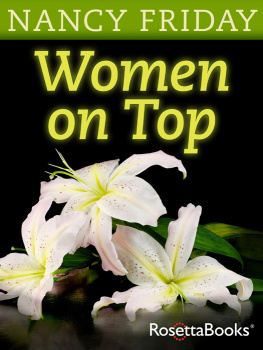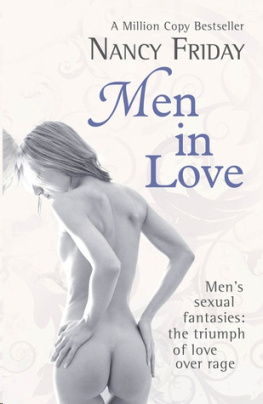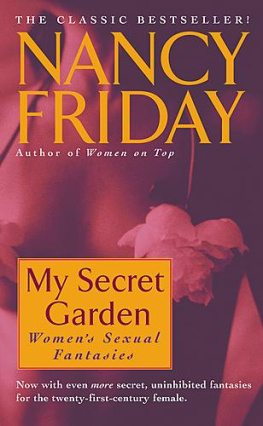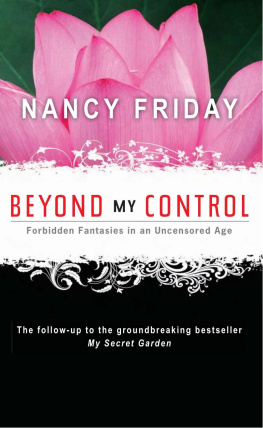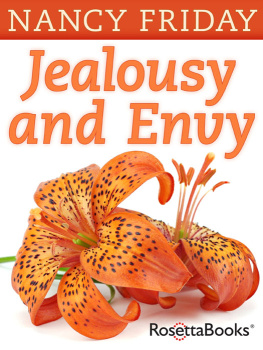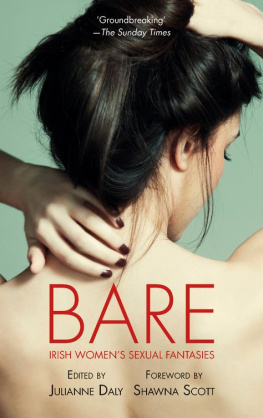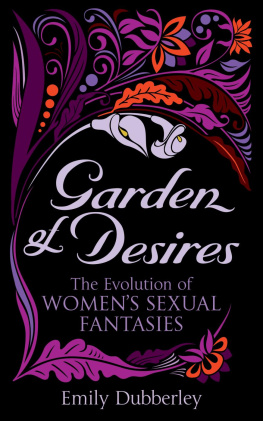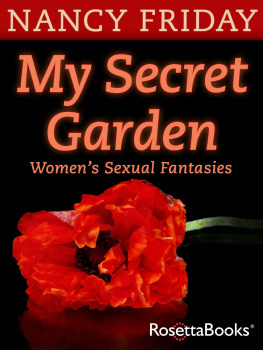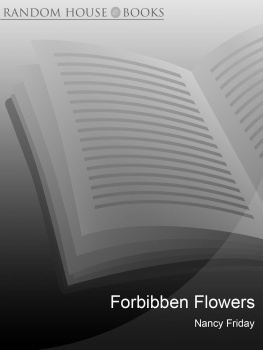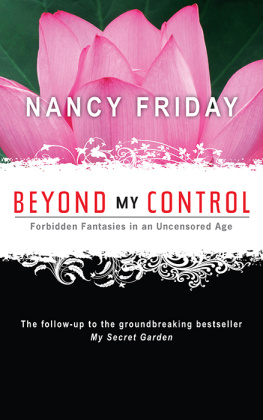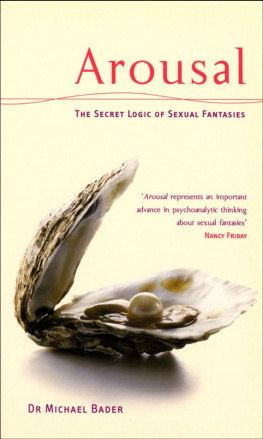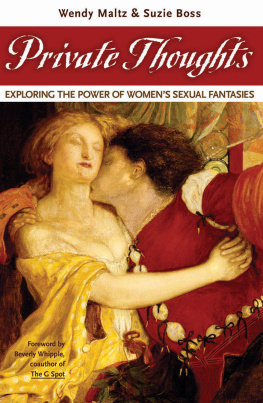Women on Top
How Real Life Has Changed Womens Sexual Fantasies
Nancy Friday
Copyright
Women on Top
Copyright 1991, 2014 by Nancy Friday
Cover art, special contents, and Electronic Edition 2014 by RosettaBooks LLC
All rights reserved. No part of this book may be used or reproduced in any form or by any electronic or mechanical means, including information storage and retrieval systems, without permission in writing from the publisher, except by a reviewer who may quote brief passages in a review.
Cover jacket design by Alexia Garaventa
ISBN e-Pub edition: 9780795335235
For Mary of Lexington, Kentucky
CONTENTS
P ART O NE
Report from the Erotic Interior
P ART T WO
Separating Sex and Love: In Praise of Masturbation
P ART T HREE
The Fantasies
Without this playing with fantasy no creative work has ever yet come to birth. The debt we owe to the play of imagination is incalculable.
| Carl Gustav Jung |
| Psychological Types, 1923 |
PART I
Report from the Erotic Interior
Its an odd time to be writing about sex. Not at all like the late 1960s and 1970s, when the air was charged with sexual curiosity, womens lives were changing at a rate of geometric progression, and the exploration of womens sexualitywell, it ranked right up there with the struggle for economic equality.
Todays sexual climate is somber. Gone are the lively debates and writings about sex as part of our humanity. The toll of AIDS, reports from the abortion battlefield, and the alarming rise of unintended pregnancies make sex seem more risky than joyful.
By their sheer numbers young men and women twenty years ago made sex a burning issue; later when the time came to go on to more serious business, they put the sexual revolution to bed. Implicit in the prim set of their lips today is that they overdid it twenty years ago; like good Calvinist children the Establishment now punishes itself for its former naughty excesses and righteously turns its back on sex. Because they are still the majority who make the rules and write the headlines, they assume they speak for everyone.
They know little of the women in this book.
These women are for the most part in their twenties, the generation that followed the sexual revolution and the initial momentum of the womens movement. Their voices sound like a new race of women compared to those in My Secret Garden, my first book on womens sexual fantasies, which was published in 1973 and is now in its twenty-ninth printing. While they have all read that earlier book and taken heart from it, these young women accept their sexual fantasies as a natural extension of their lives. Given the unique period in womens history in which they grew up, how could it be otherwise?
For them the explosive emotions we unleashed in the 1970s are still very much alive. There has never been a sexual hiatus, a cooling-off period. Sex is a given, an energy not to be deferred for more important things. Their sexual fantasies are startling reflections of their determination to abandon nothing.
Here is a collective imagination that could not have existed twenty years ago, when women had no vocabulary, no permission, and no shared identity in which to describe their sexual feelings. Those first voices were tentative and filled with guilt, not for having done anything but simply for daring to admit the inadmissible: that they had erotic thoughts that sexually aroused them.
More than any other emotion, guilt determined the story lines of the fantasies in My Secret Garden. Here were hundreds of women inventing ploys to get past their fear that wanting to reach orgasm made them Bad Girls. All in the privacy of their own minds, where no one would know. But in the mind of the symbiotic child, mother did know. The daughter could be grown and with children of her own, but if she had never emotionally separated from that first person who controlled her totally, how was she to know what was mothers opinion, what was her own? It was as if mother continued to sit in judgment throughout the daughters life, wagging her finger at the daughters every sexual move and thought.
The most popular guilt-avoiding device was the so-called rape fantasyso-called because no rape, bodily harm, or humiliation took place in the fantasy. It simply had to be understood that what went on was against the womans will. Saying she was raped was the most expedient way of getting past the big No to sex that had been imprinted on her mind since early childhood. (Let me add that the women were emphatic that these were not suppressed wishes; I never encountered a woman who said she really wanted to be raped.)
Anonymity also helped. The men in these fantasies were faceless strangers invented to further insure the women against involvement, responsibility, the possibility of a relationship. These males did their job and left. Being fucked by the faceless stranger made it doubly clear: This pleasure is not my fault! Im still a Nice Girl, Mom.
Certainly sexual guilt hasnt disappeared, nor has the rape fantasy. There is something very workmanlike and reliable about the traditional bullies and bad people whose intractable presence allows the woman to reach her goal, orgasm. But most of the women in this book take guilt as a given, like the danger of speeding cars. Guilt, theyve learned, comes from without, from mother, from church. Sex comes from within and is their entitlement. Guilt, therefore, must be controlled, mastered, and used to heighten excitement. If there is a rape fantasy, todays woman is just as likely to flip the scenario into one in which she overpowers and rapes the man. This sort of thing just didnt happen in My Secret Garden.
Fantasy is where the sexual drive does battle with opposing emotions, the selection of which comes out of our individual lives, our earliest sexual histories. What were the forbidden feelings we took in as we grew? In these new fantasies, the emotions that most often dictate the story lines are anger, the desire for control, and the determination to experience the fullest sexual release.
Admitting to anger is new for women. In the days of My Secret Garden, nice women didnt express anger. They choked on it and turned whatever rage they felt against themselves.
Anger is still a difficult emotion for women to voice in reality, primarily because we get no practice expressing it in that first, most important relationship, opposite mother. But women today at least know they are entitled to anger, and fantasy is a safe playground where they can show rage at all the obstacles that stand in their way, beginning with rage at the enormous difficulty in being sexual plus all the other things a woman today must be. These new women have no models, no blueprints. They have to make themselves up. One of the ways they try out new roles is in their erotic dreams.
Dont misunderstand me; this is not just a book about angry women. These are womens voices finally dealing with the full lexicon of human emotion, sexual imagery and language. Anger is inextricably involved with lust in reality as well as in the erotic imagination. Mens sexual fantasies are also filled with rage at war with eroticism. They take a different story line from womens largely because of mens earliest experiences with woman/mother. But rage is a human emotion, and though history until recently tells us otherwise, it is not exclusive to one sex.
I will never forget these women, for they have swept me up in their enthusiasm and taught me too. Take that! they say, using their erotic muscle to seduce or subdue anyone or anything that stands in the way of orgasm. They take the knowledge won by an earlier generation of women who couldnt use it themselves, still being too close to the taboos against which they rebelled. These women look mother square in the face and have their orgasm too.

